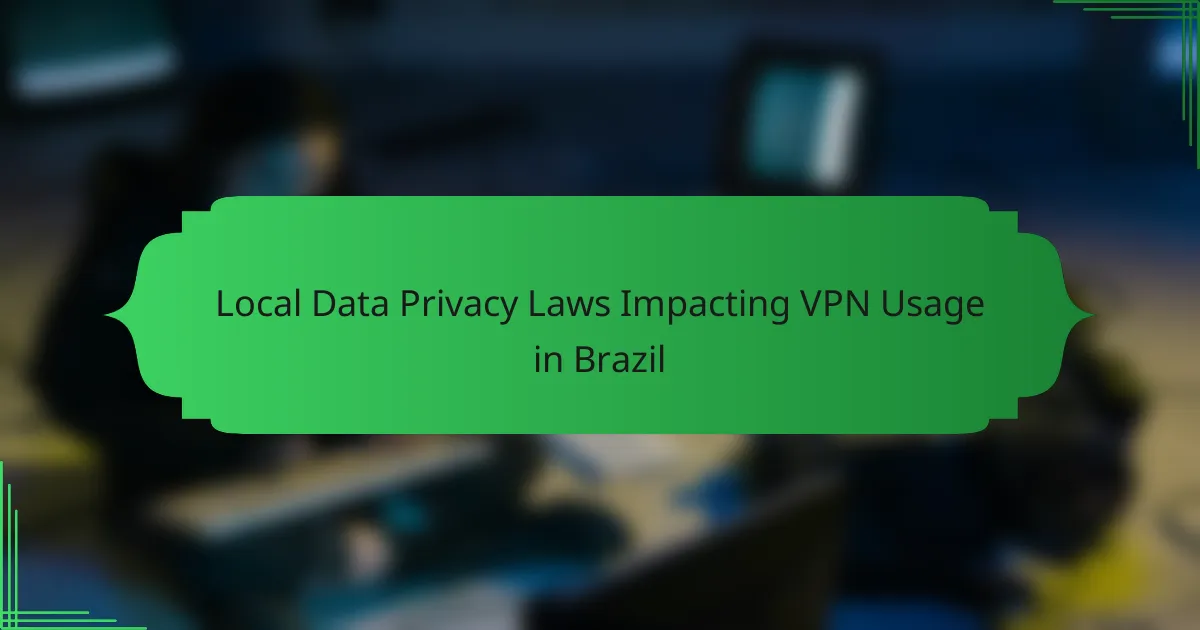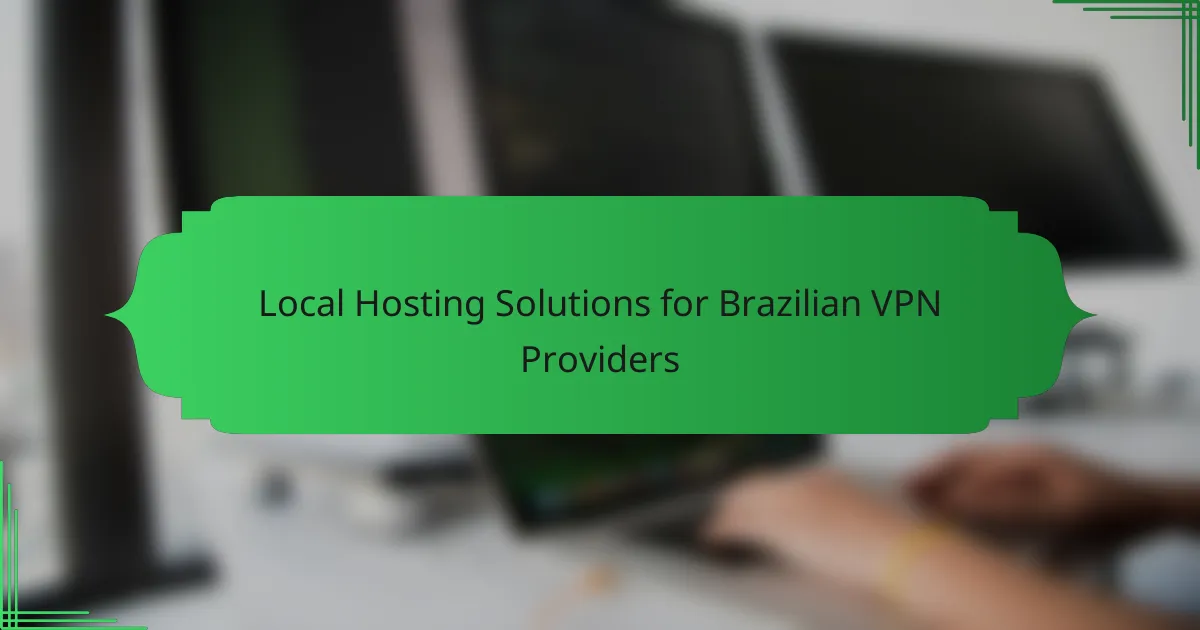In Brazil, local data privacy laws, particularly the General Data Protection Law (LGPD), play a crucial role in shaping VPN usage by enforcing stringent compliance requirements on both service providers and users. These regulations are designed to safeguard personal data, which directly impacts the operational practices of VPN services and the privacy assurances they can offer to users.
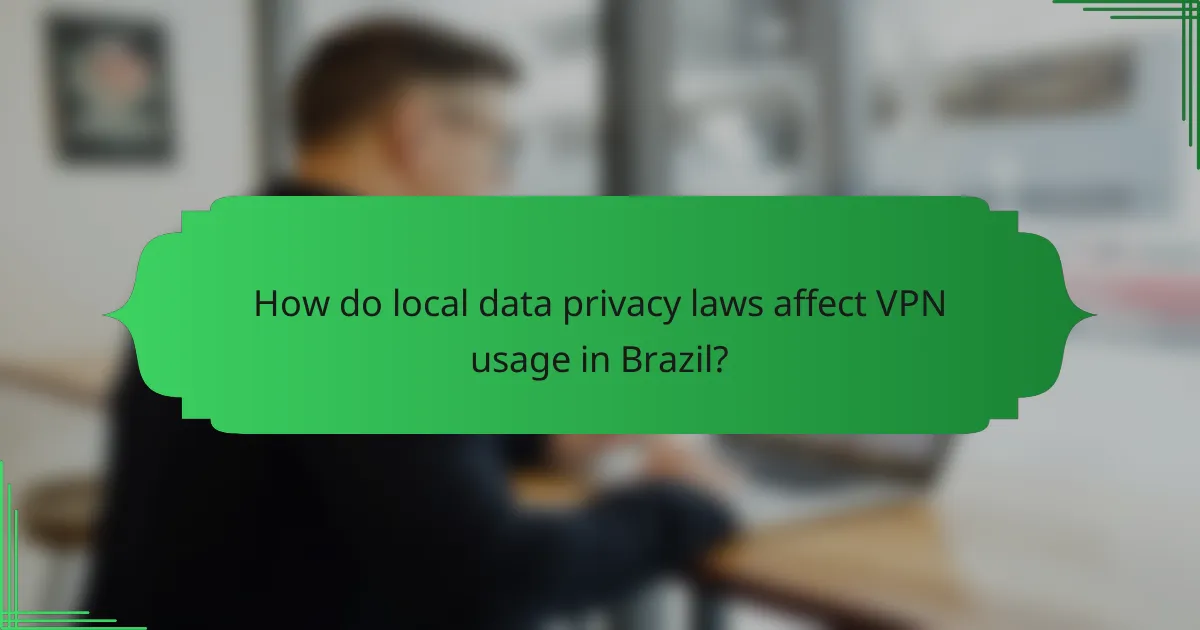
How do local data privacy laws affect VPN usage in Brazil?
Local data privacy laws in Brazil, particularly the General Data Protection Law (LGPD), significantly influence VPN usage by imposing strict compliance requirements on service providers and users. These regulations aim to protect personal data, which can affect how VPN services operate and the level of privacy they can guarantee.
Increased compliance requirements
The LGPD mandates that companies, including VPN providers, adhere to stringent data protection standards. This includes obtaining user consent for data processing and ensuring transparency about data handling practices. VPN services must implement robust security measures to protect user data, which may involve additional costs and operational changes.
Providers must also appoint a Data Protection Officer (DPO) and maintain detailed records of data processing activities. Failure to comply can result in significant fines, which can reach up to 2% of a company’s revenue in Brazil, emphasizing the importance of compliance for VPN services.
Impact on user privacy
With the LGPD in effect, users may experience enhanced privacy protections when using VPNs, as providers are required to be more transparent about their data practices. However, this also means that users must be more vigilant in understanding how their data is used and what consent they are giving when subscribing to a VPN service.
While VPNs can help mask user activity, the legal obligations under the LGPD may lead some providers to log user data to ensure compliance. Users should carefully review the privacy policies of VPN services to ensure that their privacy needs are met without compromising on the protections offered by the VPN. Choosing a provider that prioritizes user privacy while complying with local laws is crucial for maintaining anonymity online.
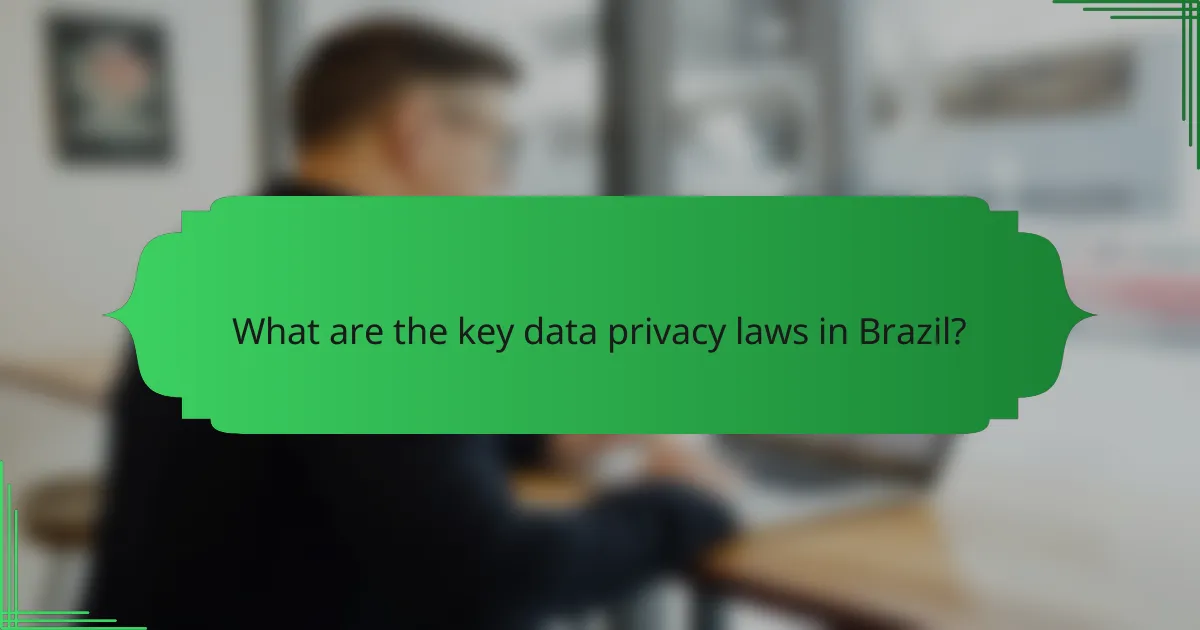
What are the key data privacy laws in Brazil?
Brazil’s data privacy landscape is primarily shaped by the General Data Protection Law (LGPD) and the Consumer Protection Code. These laws establish guidelines for data handling, user consent, and privacy rights, significantly impacting how VPN services operate within the country.
General Data Protection Law (LGPD)
The LGPD, enacted in 2018, regulates the processing of personal data in Brazil. It mandates that organizations must obtain explicit consent from users before collecting or processing their data, which directly affects VPN providers that handle user information.
Under the LGPD, individuals have rights such as access to their data, the right to correct inaccuracies, and the right to request data deletion. VPN services must ensure compliance by implementing transparent privacy policies and robust data protection measures to avoid penalties.
Consumer Protection Code
The Consumer Protection Code in Brazil complements the LGPD by safeguarding consumer rights in transactions, including those involving digital services like VPNs. It requires that companies provide clear information about their services, including data usage and privacy practices.
VPN providers must ensure that their terms of service are easily understandable and that consumers are aware of their rights regarding data privacy. Failure to comply with these regulations can lead to fines and reputational damage, making it crucial for VPN services to align their practices with both the LGPD and the Consumer Protection Code.
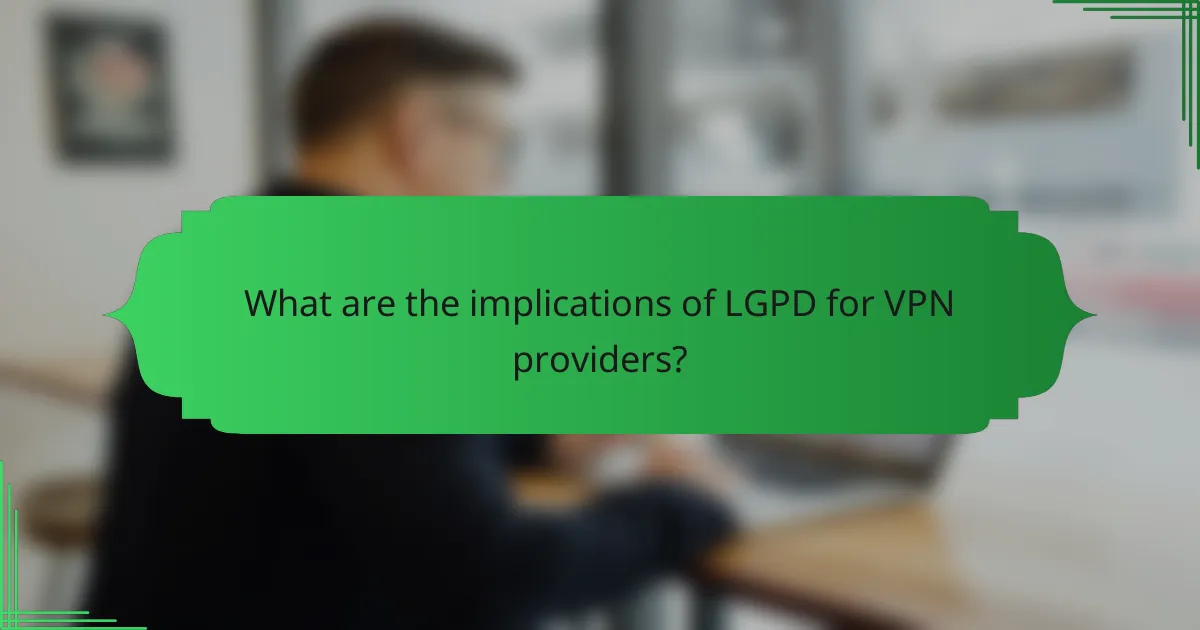
What are the implications of LGPD for VPN providers?
The Lei Geral de Proteção de Dados (LGPD) imposes strict regulations on how VPN providers handle personal data in Brazil. Compliance with these laws is crucial for VPN services to operate legally and maintain user trust.
Data processing regulations
Under the LGPD, VPN providers must ensure that any personal data they process is done transparently and securely. This includes implementing measures to protect data from unauthorized access and ensuring that data processing activities are documented and justified under the law.
VPN services must also be aware of the legal bases for data processing, such as consent, contractual necessity, or legitimate interests. Failure to comply with these regulations can result in significant fines and reputational damage.
Consent requirements
The LGPD requires that VPN providers obtain explicit consent from users before collecting or processing their personal data. This consent must be informed, meaning users should clearly understand what data is being collected and how it will be used.
Providers should implement straightforward consent mechanisms, such as checkboxes or clear opt-in forms, ensuring users can easily withdraw consent at any time. Not adhering to these consent requirements can lead to legal repercussions and loss of customer trust.

How can users ensure VPN compliance with local laws?
Users can ensure VPN compliance with local laws by selecting services that adhere to Brazil’s data protection regulations, such as the General Data Protection Law (LGPD). This involves understanding the VPN’s data handling practices and ensuring they align with legal requirements.
Choosing certified VPN services
Selecting certified VPN services is crucial for compliance with local laws. Look for providers that have undergone independent audits or hold certifications that demonstrate adherence to privacy standards. These certifications can provide assurance that the service is committed to protecting user data.
In Brazil, consider VPNs that are transparent about their data practices and have a strong reputation in the market. Services that are based in jurisdictions with robust privacy laws may offer additional security for users concerned about compliance.
Reviewing privacy policies
Reviewing the privacy policies of VPN services is essential to understand how they manage user data. A clear and comprehensive privacy policy should outline what data is collected, how it is used, and whether it is shared with third parties. Look for policies that explicitly state compliance with the LGPD.
Pay attention to terms regarding data retention and user consent. VPNs that minimize data collection and provide options for users to control their information are generally more compliant with local laws. Avoid services that have vague or overly complex privacy policies, as these may indicate potential risks.
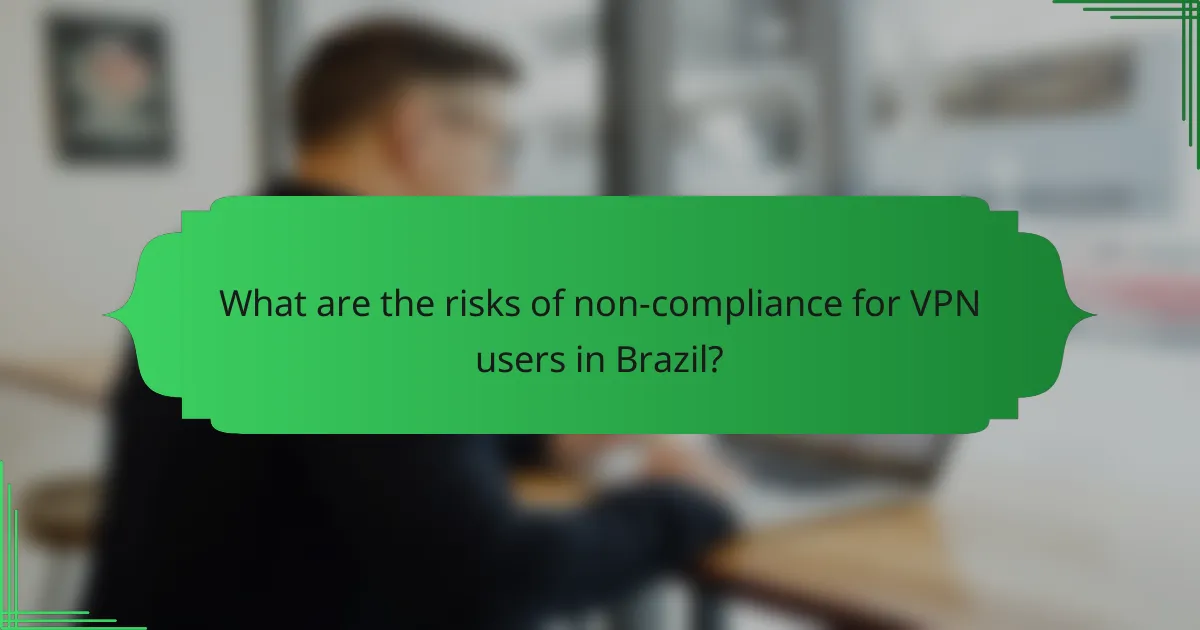
What are the risks of non-compliance for VPN users in Brazil?
VPN users in Brazil face significant risks of non-compliance with local data privacy laws, including potential legal repercussions and compromised data security. Understanding these risks is crucial for maintaining both legal compliance and personal data protection.
Legal penalties
Non-compliance with Brazil’s General Data Protection Law (LGPD) can lead to severe legal penalties for VPN users. These penalties may include fines that can reach up to 2% of a company’s revenue, capped at a specific amount, which can be substantial for businesses operating in the digital space.
Individuals may also face legal actions if they misuse VPNs to evade regulations or engage in illicit activities. It’s essential for users to understand the legal framework surrounding VPN usage to avoid these penalties.
Loss of data protection
Using a VPN that does not comply with local data privacy laws can result in a loss of data protection for users. If a VPN provider does not adhere to the LGPD, user data may be at risk of exposure or misuse, undermining the very purpose of using a VPN for privacy.
Additionally, non-compliant VPNs may not implement adequate security measures, leaving users vulnerable to data breaches. To ensure data protection, users should select VPN services that are transparent about their compliance with Brazilian regulations and prioritize user privacy.

How do Brazilian VPN users navigate data privacy challenges?
Brazilian VPN users navigate data privacy challenges by selecting services that comply with local regulations and staying updated on the evolving legal landscape. Understanding the implications of the General Data Protection Law (LGPD) is crucial for ensuring personal data protection while using VPNs.
Utilizing local VPN services
Choosing local VPN services can enhance data privacy for Brazilian users, as these providers are more likely to comply with LGPD requirements. Local services may offer better support and understanding of regional issues, such as data storage and user rights.
When selecting a local VPN, consider factors like encryption standards, logging policies, and customer reviews. Look for services that explicitly state their compliance with Brazilian data protection laws to ensure your privacy is prioritized.
Staying informed on legal changes
Staying informed about legal changes is essential for Brazilian VPN users to maintain compliance and protect their data. The LGPD is subject to updates, and new regulations may emerge that impact how VPNs operate within Brazil.
Regularly check reliable news sources or legal blogs focused on data privacy to stay updated on any changes. Engaging with online communities or forums can also provide insights into how these changes may affect VPN usage and data protection strategies.
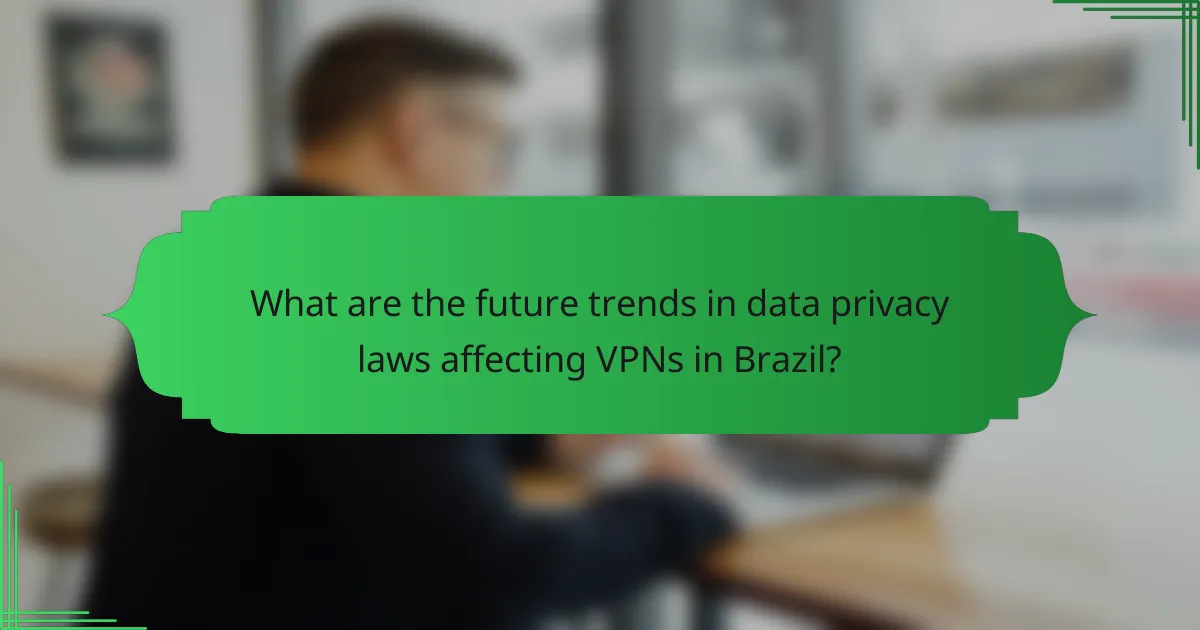
What are the future trends in data privacy laws affecting VPNs in Brazil?
Future trends in data privacy laws in Brazil are likely to focus on enhancing user rights and increasing accountability for data processors, which will directly impact VPN usage. As the legal landscape evolves, VPN providers may need to adapt their services to comply with stricter regulations and ensure user privacy.
Potential updates to LGPD
The Lei Geral de Proteção de Dados (LGPD) is Brazil’s primary data protection law, and potential updates could introduce more stringent requirements for data handling and user consent. These changes may include clearer guidelines on cross-border data transfers, which are crucial for VPN services that operate internationally.
VPN providers may need to implement more robust data protection measures and transparency practices to align with any updates to the LGPD. For users, understanding these updates will be essential to ensure they choose VPN services that comply with the latest regulations and protect their personal information.
Emerging technologies in data protection
Emerging technologies such as artificial intelligence and blockchain are shaping the future of data protection in Brazil. These technologies can enhance encryption methods and improve user authentication processes, making VPN services more secure and reliable.
VPN providers should consider integrating these technologies to bolster their security offerings. Users should look for VPN services that leverage advanced technologies to ensure their data remains protected against evolving threats and complies with the latest data privacy standards.
